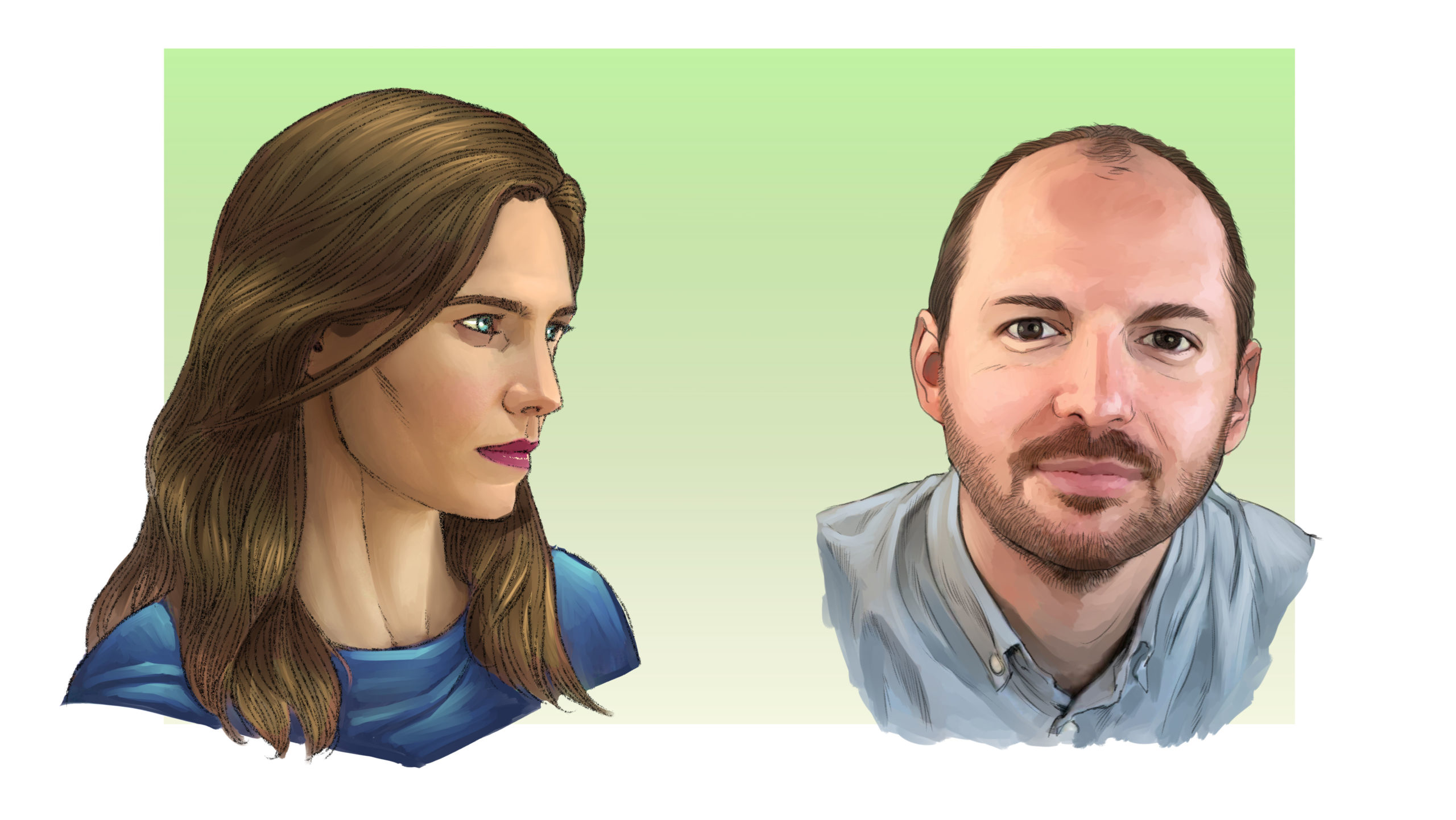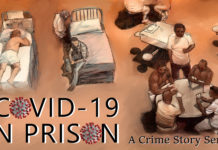The Last Gasp of the Death Penalty: An Interview with Maurice Chammah
Maurice Chammah is a Texas-based staff writer for the Marshall Project who reports primarily on the death penalty. He also organizes The Insider Prize, a contest for Texas-based incarcerated writers sponsored by American Short Fiction.
Amanda Knox
How did you become interested in writing about the criminal justice system and the death penalty in particular?
Maurice Chammah
So after college, I moved back to Austin, Texas, which was my hometown, and I found out about this little organization here that was collecting oral histories related to the death penalty called the Texas After Violence Project and they had these very heady ideas about how getting people to give testimony could be part of a larger project of archiving and documenting what goes on in our justice system and the kinds of trauma that murder victims and also family members of people who’ve been executed experience. So that was my first job out of college and then I drifted towards journalism as a way to research things in the world and write about them for a broader audience. And that early experience doing oral history meant that I knew just enough about the subjects to feel comfortable cold calling a defense lawyer or a prosecutor and pitching those stories when I was doing internships and early freelancing. Then I was very fortunate to get this job at the Marshall Project that locked me in on just doing criminal justice. After more and more years go by, you develop an expertise. The more you study one subject, whether the criminal justice system or the death penalty, the more story ideas you come up with, the more you see trends and issues before others do. And it just becomes your beat, whether formally or not. I found that once I knew a little bit about the death penalty, it was, “Oh, there are all these things nobody has really thought about or know.” One of my early major Martial Project stories on the death penalty was just the stray comment from a prosecutor that he couldn’t seek the death penalty in a case because it was too expensive, and it sent me down this rabbit hole of finding every prosecutor I could to talk to about the subject, and in the end, it turned out that a major driving force behind the decline of the death penalty was that it was breaking the bank for small counties. You have a city like Houston, they can afford all of the experts, all of the investigation, all the best defense lawyering, but in small towns, they were having to raise the tax rate. So I got deep into this fascinating world. And I don’t know that I would have even found out about that if I were not already on the phone asking prosecutors about why they seek the death penalty.
Amanda Knox
What can you tell me about the history of the death penalty here in the U.S.?
Maurice Chammah
We certainly inherited it from Britain and Europe. Really, most societies in most of history have had some version of the death penalty, although many times there has been a lot of ambivalence around it, where we like the idea of executing people who commit serious crimes like murder, but then, in actuality, we don’t really kill everybody who commits that crime. Even before the founding of the United States, you would have these situations in England where somebody could just get up on the stand and get a warning, essentially. Technically, there was the death penalty for a crime, but there are all these escape valves so that not that many people were actually ever executed. So then we bring it to the U.S. and it gets bound up very, very tightly with the history of slavery, post Civil War reconstruction, Jim Crow laws, lynchings. There are laws saying you can get the death penalty for these murders. There are also all these lynchings where a mob of white people would abduct someone and kill them on very, very thin evidence, and the line between those illegal mob lynchings and legal executions could often be very thin. An anecdote that often haunts me is this story of a man who was accused of murder. His trial lasted four hours. And as it was going on, this was in the 1910s, he could hear the saws outside the courthouse, because they were constructing a scaffold to hang him on even as his trial was going on, and he could hear that sound coming in. So that shows you the thin, thin line between the mob justice and the legal entity. So fast forward, in 1972, the Supreme Court issued this landmark ruling saying all of the death penalty laws in the United States violate the Constitution. They don’t say the Constitution never allows for that penalty, because honestly, the Constitution says, “You can’t be deprived of life without due process,” but that suggests that you can be deprived of life. So the Supreme Court decision, instead of ending the death penalty, actually spurs a bunch of states to reinvigorate their commitment to it. It had been really disappearing in this country into the ’50s, ’60s, Civil Rights era, it had been dying a slow death, and then the Supreme Court telling the states, “You can’t have this anymore,” leads to a major backlash. It’s also a bit of a backlash to Civil Rights legislation coming out of Washington, and the result is that all of these states commit themselves anew to the death penalty. And then, throughout the ’80s and ’90s up until about the year 2000, you see hundreds and hundreds of people being sentenced to death, dozens and dozens of executions every year. It peaks around ’99, 2000. And that’s when we see close to 100 executions around the country. Ever since then it’s been on a downward swing. There’s the number of people who are sentenced to death, and then there’s the actual execution, both those numbers have been trending downward for the last 20 years or so, and I have seen very little to suggest that there’s going to be a big upswing, though I also have seen a lot to suggest that it’s going to be a while before they disappear entirely. You’re still going to see death sentences for Dylann Roof for the Charleston shooting, right? These cases are a last gasp of the death penalty as it slowly peters out.
Amanda Knox
How is our commitment to the death penalty, however dwindling and last gasp-y, compared to other first world democracies?
Maurice Chammah
The vast, vast majority of economically comfortable countries in the world do not have the death penalty. Europe has abolished it, totally abhors it. There is one strange and interesting example that is also a democracy, also first world, and also carries out the death penalty, and that is Japan. I’ve talked to some Japanese journalists about this, and in certain ways, it actually sounds a lot like the United States, in that there’s a lot of democratic buy in. People support it. And one of the most fascinating ideas about the death penalty I’ve stumbled upon over the years is, so there are all these efforts to answer, “Why does the United States have this?” and part of it is related to this very naughty history of racial injustice in this country, that we tend to see people with dark skin as lesser and that penalty is a piece of that story. But there’s also this way that we see the death penalty as democratic. So whereas in Saudi Arabia or Iran or China, you have this big authoritarian government saying, “We’re going to send this person to death,” here, you have the often family members of a murder victim saying they support the death penalty in the media, you have prosecutors who are making the decision of whether to seek the death penalty who are elected by the public, you have a jury which is drawn from members of the public actually sentencing this person to death, and then, you have to actually carry out an execution, the governor’s office has to be involved. The death penalty exists as this thing that whether one of us as an individual supports the death penalty or not, it’s a public policy that we all have a bit of buy in on, because it’s pursued by us as members of juries, and us as voters for prosecutors and governors.
Amanda Knox
What are the justifications that remain for those who would like to prevent the death penalty from being abolished in our country?
Maurice Chammah
For a long time, people believed that the death penalty deterred other people from committing murder. There’s really no proof that that’s true. And so what we’re left with is that it’s our society’s way of saying, “Some crimes are so terrible, so egregious, that you deserve the death penalty.” And, of course, over the years, people who oppose the death penalty, along with journalists and advocates, have found all the ways in which our country utterly fails by any metric to isolate which crimes and which people are really “the worst of the worst” or more deserving of this kind of retribution. You’ll have occasional cases where the crime is so shocking and awful to people, like the Boston Marathon bombing, the Oklahoma City bombing, that it really makes people who oppose the death penalty have to question whether they’re willing to keep that opinion even in the face of such awful crimes. But those are the cases that still allow supporters of the death penalty to say, “Look, there’s some crimes that are so beyond the pale that we need to have true retribution, and a life sentence in prison is not enough, and even if we give this guy a life sentence in prison, that doesn’t mean he’s going to lead a riot or kill a correctional officer or try to escape.” That’s the kind of justifications you hear. But overall, even people who support the death penalty are less committed to it than they once were. In the year 2000, when George W. Bush ran for president, the death penalty was this huge issue. It was up there with gun control and abortion, almost the way we think about climate change now, as this like signature issue that everybody cared about because it said something really deep about our country and our values. That has really fallen away. Now the death penalty is this oddball, once in a while issue. I mean, President Trump oversaw three executions earlier this month, and yes, there was a pandemic, but the extent to which that didn’t really crack the top layer of people’s awareness, whether measured by Facebook or Twitter or Fox News, is really telling to me that the death penalty has lost its centrality even in our conversation about criminal justice. People are much more focused on what police do, on prison conditions, than they are on the death penalty. There’s still a handful of very, very prominent and active opponents of the death penalty. Probably the standard bearer against the death penalty that most people in America might have heard of is Bryan Stevenson. He’s become one of our signature speakers on the history of racial injustice, and is himself a death penalty defense lawyer who defends men facing the death penalty. But other than him, there’s fewer fighters and fewer fights. That’s not to say that there are none. Last year there was a very dramatic case in Texas in which a man got very close to execution. His name is Rodney Reed, and there were really, really compelling questions about whether he had committed the crime at all. It also tapped into some deep racial questions, because he was a black man accused of, he had slept with the white fiance of a white cop in town, and it’s believed that maybe the cop is the one who killed his own fiance. That’s the overriding alternate theory on the case. Anyway, Rodney Reed got very close to execution and Beyonce, Oprah, all these people came out in support of him. And that is rare. The moment that really shocked me in that saga was that Ted Cruz, a very, very prominent, very conservative Republican, a huge supporter of the death penalty, said, “We really should take a second look at this evidence. Maybe we shouldn’t execute this guy.” That was just a sign that the temperatures have cooled, and his opponents have really benefited from the fact that many conservatives are looking at the criminal justice system more skeptically than they used to.
Amanda Knox
There have been efforts to maintain capital punishment. Have those been counterbalanced by efforts to prevent capital crimes from happening in the first place?
Maurice Chammah
That’s a great question. So a capital crime is usually defined in most state laws as, forgive my informal tone, a very bad murder. That could mean a murder along with another crime, like kidnapping or rape. It could mean killing multiple people. It could mean details about the crime are especially heinous. And prosecutors have been winnowing away at the number of times they actually seek the death penalty to the really worst ones. There might be plenty of criticisms to be made of their choices, but they’re definitely seeking it against fewer people. And so they’re theoretically being more judicious in which cases they go for. That said, there has been a decline in murder in America over the last 20 years or so, and that decline is a mystery to a lot of people. There’s not one widely shared understanding of why precisely the number of murders went up so much in the ’70s and ’80s and into the ’90s, and why it’s been falling ever since. One of my colleagues did a story five years ago that was about all the different theories. There’s less lead in the paint, so that’s having different effects on people’s brains which are related to violence. The baby boomer generation came of age at a particular time and there was a population swell, so maybe there were more murders because of that. There’s all these theories out there, and we have yet to really get why. But we do know that the number of murders and capital murders, there’s just fewer of them than there used to be. That said, the reasons why capital crimes happen, we now know, is a whole massive range of public policy failures that lead to crime. Those failures involve mass incarceration, homelessness crisis, mental health crises, opioid and methamphetamine addiction crises, there’s all of these different plagues and ills in our society that we have done a fairly poor job of helping, and you ultimately won’t see violent crimes decline until you address some of those bigger systems.
Amanda Knox
Is there any particular death penalty case that you’ve looked into that stood out to you?
Maurice Chammah
A few years ago, I got to know a death row inmate very well. I’ll start from the beginning. Nevada announced that it was going to start carrying out executions. The state had not carried out any in many, many years and they were going to use the drug fentanyl to carry out this execution, which is just striking and bizarre because it’s a drug we mostly associate with overdoses. The first person who was going to be up for execution in the state was a man named Scott Dozier, and Dozier had this not unique, but fairly uncommon issue where he’d stopped fighting. So you get sentenced to death, and you theoretically get a lawyer who fights on your behalf by filing appeals in your case and this can go on for years, if not decades. But Scott Dozier said, “I don’t want to fight it. I just want to be executed. I don’t want to live in prison wondering if I’m going to be executed or not. I really would rather be dead than live my life this way.” And that, to me, was compelling for two reasons. One, that’s just a psychologically interesting phenomenon, but two, the fact is that him saying that forced the state of Nevada to start setting up to carry out an execution, which is a lot of work in the sense that you have to get the drugs, you have to come up with protocols, you have to bring in media. It’s a whole circus, and the idea that the circus was being driven by this death row inmate, the idea that this man, someone we as a society had decided was unfit to live among us and that we wanted him to get the ultimate punishment and be wiped from the earth, that he then suddenly had the power make a lot of things happen, that was just so bizarre that I was fascinated and wanted to know more, and I ended up sending him a letter. He called me. We had a lot of conversations. I flew to Nevada. I spent time with him in prison. I interviewed him quite a bit, got to know all these people around him, his family members and friends. And the case stood out to me because it was an encapsulation of how discombobulated our death penalty system is. This idea about how you have like hundreds and hundreds of people on death row awaiting execution, and yet very little will at the governor level to carry out these executions. And then you have Scott Dozier forcing the state’s hand, forcing society’s hand, and forcing us to reckon with, “Do we actually want this? Are we really willing to commit to the death penalty?” And what do you do when the man who you want to send us to death is saying, “Bring it on”? It challenges us in an interesting way. It says so much about our society’s ongoing ambivalence, where we support the death penalty, but we also feel uncomfortable about it.
Amanda Knox
Did he talk to you about why he wanted to be executed? Was it because he felt like he deserved the punishment? Or was it because the life that he was forced to live in confinement was unbearable to him?
Maurice Chammah
It was mostly the latter. He found the idea of living in prison forever somewhat unbearable. He had lived the rich, vagabondish lifestyle outside of prison. He’d worked in casinos and drifted into meth. His whole story sounded very Breaking Bad-ish. He was attracted to living on the margins by making and dealing methamphetamine. And so he lived in this very free way in the outside world and he found prison unbearable, even with access to a television and a radio, relationships with friends and a supportive family, just the whole idea that spending the rest of his life that way was unbearable to him. He also said, “This may bring the family of the victims in these cases some measure of peace or closure or whatever, and that’s great with me.” He bore no ill will towards them. To the extent that they were going to get any kind of satisfaction from his execution, he was supportive. So it was kind of both, but I would say that the overriding factor was that he just didn’t want to live in prison anymore.
Amanda Knox
What was the ultimate outcome of that case?
Maurice Chammah
It was really tragic. The state struggled to get the execution drugs, and once they got them, defense lawyers challenged them on it, and it went back and forth through the courts, and he just sat in limbo for a very long time. And then over time, the conditions for him in prison got worse. There’s a lot of murkiness over what the prison’s motivations were, but they started putting him in solitary confinement. He thought it was to punish him. They said they thought he was at risk for harming himself. So ironically, because they thought he was suicidal, they made life worse for him, which made him more suicidal. In the end, he took his own life. He was never executed, because he beat them to it. This was in January of 2019. I had actually been on an international flight, on a plane for 20 hours, so I was in this really hazy space, and my phone comes back on, and I have all these texts being like, “Sorry to hear this,” and I was just a journalist who’d been interviewing Scott, but people understood that that means you get to know someone and I didn’t understand what this was about. So then I googled his name and saw the news articles and a press release and I was surprised by how hard it hit me. Not because I had any particular views on the justice of his death sentence or anything like that, but you don’t as a journalist sometimes realize how well you’re getting to know someone, and you don’t realize that that little caring part of yourself is being activated until something like this really shows you, “This was someone who was in my life. He was in lots of people’s lives and what a tragedy when someone takes their own life.”
Amanda Knox
Reflecting upon it over the past year, do you have any further thoughts about what his case reveals, if anything, about our criminal justice system that people don’t understand or take for granted?
Maurice Chammah
It’s a really good question. I think that it shows that a much bigger reckoning we’re having right now when it comes to the criminal justice system is what do we do, period, when someone does something so horrible that it offends our sense of them as a person and leads us to think that they deserve very, very harsh punishment? And Scott Dozier was accused of beheading someone. I should have led with details of the crimes, which were horrific. He’s accused of beheading someone as part of his meth empire and he killed another man, too. So what he did was terrifying and horrible. I then meet this man 15 years after the fact and he’s this chummy, gregarious guy who reminded me a lot of people I grew up with. I was a musician and had been in a band many years ago, and mentioned just in passing the name of the band and then it turned out that he could find our music through a tablet he had access to in the prison. So then he calls me and says, “I was listening to your band’s music,” which was a very weird interaction. But I’m kind of musing on this to say that I think as a society, as we think about what the future of our criminal justice system looks like, we are going to have to reckon with what to do with the worst, scariest crimes. We can improve our mental health and other public policy systems to try to reduce the number of crimes that happen and reduce the amount of violence in society, we can change our laws so that people who are arrested for just possessing some drugs or violating their parole, doing something nonviolent, don’t get a really harsh punishment. We can do all of that and you will still have crimes like the ones that got Dozier committed, and we can debate whether the death penalty is appropriate for any of those cases, but we’re still gonna have to reckon with the fact that there’s a lot of crime and we have not as a society to come up with an answer for that other than long terms of incarceration, which lasts so long that the person may be transformed. Again, I’m not saying that Scott Dozier necessarily was, but his case was an illustration of how someone really can change. The man I met was not the type to behead someone. And we have to kind of reckon with these deeper questions of when someone transforms over a long course of time, what do we do with them? And how do we make amends after a really violent crime has happened? A colleague of mine just published a really great story about restorative justice. It’s a long standing phenomenon, but not, still not used very much. And it offers one answer. I think these answers are really necessary because, as shown in Scott Dozier’s case, and many others, people spending decades and decades in prison, it’s a waste of a lot of things. It’s very, very expensive. It’s unclear what kinds of satisfaction that provides for victims. There’s a lot of human potential that goes to waste as well.
Amanda Knox
Speaking of human potential behind bars, tell me about the Insider Prize.
Maurice Chammah 40:58
Sure, I would be thrilled too. So for the past three years, my wife Emily and I have run this little contest for fiction and nonfiction for people who are incarcerated in the state of Texas. PEN America runs a prison writing award every year, and we had seen that that gives men who are in prison something to work towards and a lot of hope. And similarly, at the Marshall Project, we publish writing by incarcerated people every week, and I’d seen that that gives readers a sense of connection to people in prison that even the best journalists can’t quite provide because there’s just something about the first person and the direct experience that comes across differently in writing. So, what then happened was, we are both involved with a literary journal in Austin called American Short Fiction, also with a great creative writing professor at the University of Texas named Deb Olin Unferth, she had been teaching a class at a Texas prison, had maybe a dozen men who were writing poetry and prose and fiction and nonfiction under her guidance, and they all wanted more opportunities to publish, so she came to Emily and I and American Short Fiction and said, “Let’s cook up this contest.” We advertised widely. We get submissions every year. We have also been really lucky that we can get really well known writers to be the guest judges, which has the benefit of being exciting for the people who are submitting, knowing that these well-known writers like Joyce Carol Oates or Justin Torres are reading their work, but also, those names carry weight when you then publish the winners and you say, “These are the winners of this contest, and they were picked by Joyce Carol Oates who you’ve heard of.” That makes people more likely to engage with the material. We’ve just finished the third year of doing this, and the winners are going to be published in the next couple of weeks by both American Short Fiction and also the Texas Observer, which we’re very excited about.
Amanda Knox
Who enters the Insider Prize? And what kind of stories do they tell?
Maurice Chammah
We mostly get submissions from men in state prisons who’ve been there for a long time. And those submissions fall into two categories: writing about prison and writing not about prison. The writing about prison often takes you really deep into the culture of prison, interactions with guards, interactions with other prisoners. In Texas in particular, a lot of prisoners work outside in the fields, and so you get these very rich accounts of hauling corn and being under the threat of this guard on a horse near you. The imagery sometimes feels like it’s out of old slave plantations. And then when people write about non-prison subjects, sometimes it has to do with their imagination, often it has to do with the issues that got them into prison in the first place, whether their life has circled in some way around addiction or trauma from being a child. But also some of the really poignant submissions are nostalgic revisiting of childhood memories. You have people who’ve maybe been in prison for a very long, long time and remember with a lot of happiness life before poverty and drugs and other problems came into their lives. We had a great piece by a guy who grew up on a farm that had horses and it’s just this whole account of interacting with this horse and it’s very placid and bucolic and just really brings to life rural Texas in the ’50s. There’s a tragedy attached to that one. The man who wrote it, who’s a really brilliant prison writer, died after submitting. He died of the coronavirus, which has been spreading like wildfire, and he knew it. He knew he was in danger, and even as he knew that he was in danger, he was writing these letters that were funny and vivid. He managed to keep his eyes open and the sense of humor, even as he knew that he was at risk, and then he passed away. At the Marshall Project, we published an obituary that was mostly his own writing. We’re going to publish a whole piece by him along with the winners of the Insider Prize, which will hopefully honor him and call attention to the human potential lost, both in the incredible number of people that we incarcerate and the ways in which we fail to protect them when things like pandemics come along.
Amanda Knox
What happens with all of the work that’s submitted? Does it all get published? Does it all get gathered together in a volume?
Maurice Chammah
The answer right now, to be totally candid, is that it’s sitting in boxes in our house and we have not figured that out yet. We got three years of submissions. Long term, it would be great to either try to publish it online or at the very least archive it. There’s a rich trove of prison writing here that shouldn’t just go into the ether and so we’re kind of preserving it with the hope of finding a home for it at some point.
Amanda Knox
What kind of obstacles do imprisoned authors and journalists have to getting their work out into the world? And how are you attempting to overcome those obstacles or to bridge that gap?
Maurice Chammah
The simple answer is there are a lot. There is quite rampant censorship of the writing that prisoners do. Prisoners have gotten in trouble for their writing, for trying to publish. And then you have the harder to measure sort of social issues. You have of course stigmas, where the public is like, “This guy’s a prisoner. He probably deserves to be there. And so I’m not interested in what he has to say.” Then, the education programs in prisons are so meager that incarcerated writers struggle to hone their skills and get from “I enjoy writing” to thinking at a deeper level. We in the free world take for granted that you can nurture an interest and find mentors and improve your skills, whether it’s writing or anything else. So those are also barriers, in addition to the official ones that come down. And there are some efforts out there. Our prize is an effort, and Deb Olin Unferth has something called the Pen City Writers. PEN America is also trying to help incarcerated writers both get their work out through their prize, and they also have worked with theatre groups. I went to an amazing event in New York City a few years ago in which you had like professional actors performing the written work of the incarcerated writers. A lot comes from magazine editors, book editors, book agents expressing interest in pushing the work of incarcerated writers and seeing potential in the early drafts and then working with them slowly. One more thing I’ll say is that Pen America has a pretty innovative program called the Writing For Justice Fellowships. They take writers usually who have some experience with the criminal justice system directly, whether or not they’re still currently in prison, and they pair those writers with mentors. Two years in a row I have done this and my mentees have been currently incarcerated writers. One was a guy in Texas named Thomas Whittaker and the other is a guy in Washington named Arthur Longworth. Both are extremely good writers and it was very fun to work with them at high level thinking about structure and humor, almost like a two-person MFA program. We’re still working to get them both published in literary journals and trying to get the attention of book publishers. So that’s also a version of it. But of course, it’s very hard to get a book published even if you’re not incarcerated. I think that there’s just a lot of incarcerated writers out there who would benefit so much from a bit of mentorship and a bit of exchange with a writer on the outside world. So I think, long term, if we could sort of set up networks that would connect writers inside and outside to work with one another, that would be a path to getting over some of the barriers in publishing incarcerated writers.






